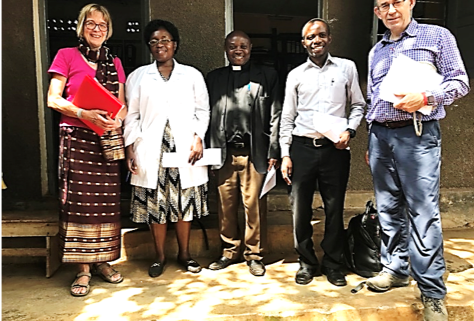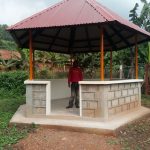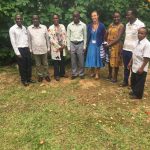A very psychologically minded hospital
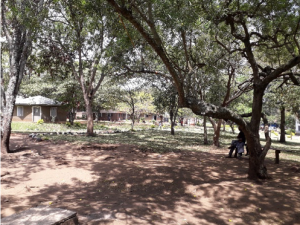 We first visited St Paul’s in Kasese in November 2018. St Paul’s is a Health Centre IV, essentially a small hospital, on the edge of town.
We first visited St Paul’s in Kasese in November 2018. St Paul’s is a Health Centre IV, essentially a small hospital, on the edge of town.
A former chapel building has been creatively divided up to form wards. It is surrounded by other buildings housing a range of facilities, and trees provide welcome shade.
When she arrived at St Paul’s in June 2018, Alihabwe Sudaat, the Psychiatric Clinical Officer (PCO), was soon given the opportunity to attend the mhGAP Train the Trainers course, sponsored by Jamie’s Fund, and delivered by some of the Ugandan tutors at Butabika Hospital.
In her Mental Health role, Sudaat was seeing about 10 patients a month. Because of the
cost, few of her patients were able to return to St Paul’s for follow-up after leaving the
hospital.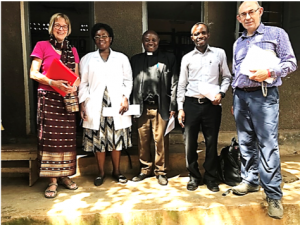 Apart from a psychologist colleague in the HIV/AIDs service, at that stage Sudaat was a little isolated professionally, and perhaps needed support to gainmore confidence in her role.
Apart from a psychologist colleague in the HIV/AIDs service, at that stage Sudaat was a little isolated professionally, and perhaps needed support to gainmore confidence in her role.
She qualified in mental health 10 years previously, but as so often happens, she had worked in other departments. St Paul’s was her first full time MH post.
Jamie’s Fund supported Sudaat and some of the mental health staff from Bwindi and Kagando Hospitals to meet and share ideas and experiences about services and data collection. They all embraced this opportunity enthusiastically, soon spending a couple of days together at Bwindi.
Feeling encouraged, Sudaat and her colleagues rolled out a very successful mhGAP course for the non-specialist staff at St Pauls, teaching them to identify and successfully treat common presentations of mental ill health.
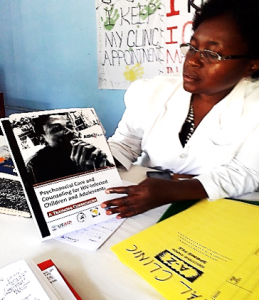 On our visit in September 2019 we found a newly trained and highly enthusiastic team eager to report on their progress and offer ideas for future developments.
On our visit in September 2019 we found a newly trained and highly enthusiastic team eager to report on their progress and offer ideas for future developments.
Most of them not only had received mhGAP training but have also been through a new psychosocial support training programme designed to enable support to families affected by Ebola, currently rampaging in nearby Democratic Republic of Congo.
(Thankfully the one case of ebola that came into Uganda was very effectively dealt with at Kagando Hospital).
Reverend Dr Peter, the new medical director at St Paul’s, is warmly supportive of all developments, both current and potential, to improve services for people with psychological problems, mental illness and epilepsy.
He told us that so many of the individuals who present to the hospital with physical symptoms in fact have depression and anxiety. The hospital now has this newly trained team putting their skills to very good use in detecting and treating such patients.
The team has identified a particularly vulnerable group: local teenagers and young adults. Like many young people in Uganda, they are troubled and anxious, and many turn to drugs and alcohol. The rates of self-harm are worryingly high.
The hospital runs a service specially designed for them – 80-100 attend regularly – and children with disabilities also have a special place. They would love to have a centre for children with special needs in their newly planned Mental Health Centre.
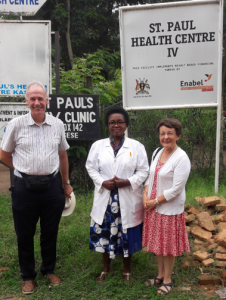
Madam Sudaat with Dr Simon and Dr Maureen
St Paul’s can in truth be described as “a very psychologically minded hospital”.
They have plans to reach further into the community. Sudaat and her local colleagues, together with others from Kagando hospital, have continued to roll out mhGAP training to include health centre staff, opening up the possibility that mental health clinics could be held at the health centres, bringing the service much nearer to the people and solving the challenge of transport costs.
The cathedral in Kasese is proving a great focus for sensitisation programmes: take the message to where the people are! Sudaat is finding that even some of the African church pastors are beginning to see that modern medicine can be helpful for epilepsy and mental illness.
The St Paul’s team has planned an ambitious programme of further sensitisation and training for clergy, police, prison officers, teachers and local leaders.
Linda Shuttleworth and Maureen Wilkinson

